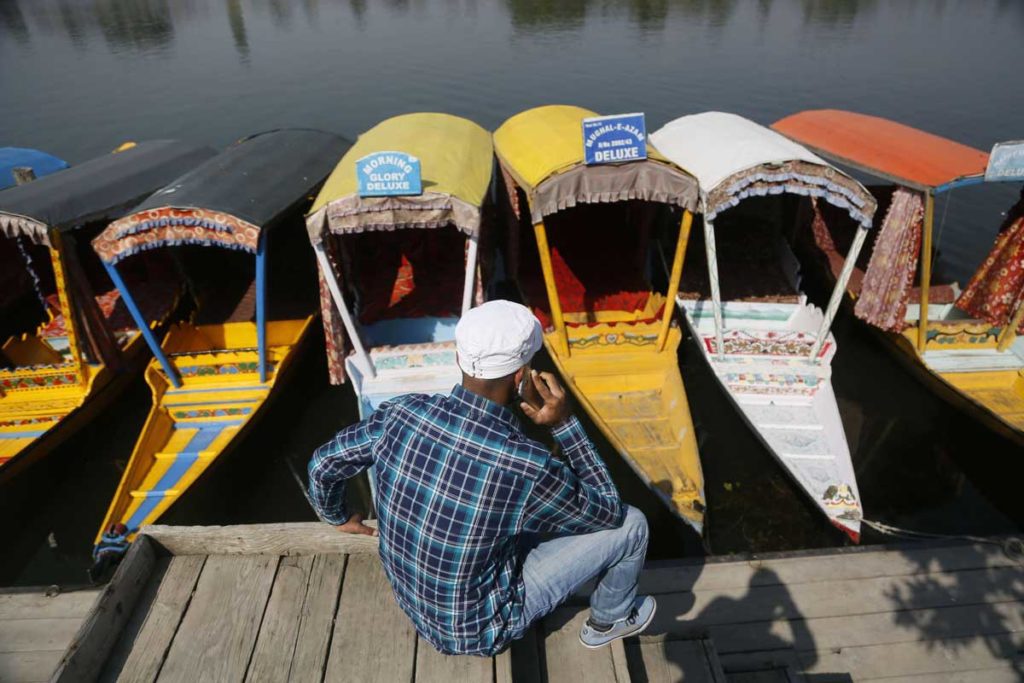 A Kashmiri boatman talks on his cellphone as he sits on the banks of the Dal Lake in Srinagar, Indian controlled Kashmir, Monday, Oct. 14, 2019. Postpaid cellphone services were restored in India-administered Kashmir on Monday, more than two months after India's government downgraded the region's semi-autonomy and imposed a security and communications lockdown. (AP Photo/Mukhtar Khan)
A Kashmiri boatman talks on his cellphone as he sits on the banks of the Dal Lake in Srinagar, Indian controlled Kashmir, Monday, Oct. 14, 2019. Postpaid cellphone services were restored in India-administered Kashmir on Monday, more than two months after India's government downgraded the region's semi-autonomy and imposed a security and communications lockdown. (AP Photo/Mukhtar Khan) By AIJAZ HUSSAIN and SHEIKH SAALIQ Associated Press
SRINAGAR, India (AP) — postpaid cellphone services were restored in India-administered Kashmir on Monday, more than two months after India’s government downgraded the region’s semi-autonomy and imposed a security and communications lockdown.
Landline phones were restored in the region last month, but the ban on more than 2 million prepaid mobile connections and internet services will continue.
Authorities fear that insurgents and separatists demanding independence from Indian rule will use the internet to provoke protests in the region that could morph into large-scale street demonstrations.
Tensions in Kashmir, which is divided between Pakistan and India but claimed by both in its entirety, have escalated since New Delhi’s surprise decision in early August to downgrade the region’s semi-autonomy. India followed the move by sending in tens of thousands of extra troops, detaining thousands of people and blocking cellphone and internet services.
Residents appeared relieved Monday after facing difficulties during the long communications embargo. But the region continues to simmer with anger.
“It is a relief,” said Mohammad Akram, a trader. He was, however, quick to add how Kashmiris are expected “to thank the government for giving them basic amenities.”
Some said that having no lines of communication for the past two months was akin to living in the Stone Age.
“Thank you, India. You have finally decided to partially restore our digital rights,” said Sameer Ahmad, a college student. “When will you restore our political rights?”
Facing international pressure to ease people’s suffering and restore normal life, Indian authorities announced last week that they would allow tourists back into the region after ordering them to leave in August because of security concerns. The government has said that internet facilities are being opened at tourist spots in the region.
“Whatever India does in Kashmir, it is driven to consolidate its position,” said Ali Mohammad, a schoolteacher. “They stopped phones and internet services to stop us from registering protests. Now they are restoring these services to cater to tourists and declare normalcy in Kashmir.”
The authorities have put out newspaper ads aiming to send across a message of normalcy in the region. A full-page advertisement in Friday’s Greater Kashmir daily urged people to reopen their shops and send their children back to school.
Authorities also released three low-ranking politicians in the region last week. However, prominent Kashmiri politicians, including some who have historically accepted India’s sovereignty over the disputed Muslim-majority region, remain detained in their homes or in jails.

Credit: Associated Press
Inside Telecom provides you with an extensive list of content covering all aspects of the Tech industry. Keep an eye on our News section to stay informed and updated with our daily articles.